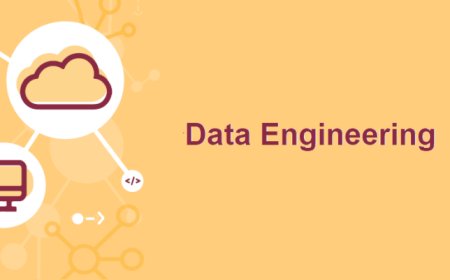Ethical Data Engineering: The Challenges of Responsible Data Handling
Explore the challenges and principles of responsible data handling in Ethical Data Engineering. Discover key insights into ethical data practices.

In today's data-driven world, the importance of responsible data handling cannot be overstated. As businesses and organizations collect and analyze vast amounts of data, there is a growing awareness of the ethical considerations that must be taken into account. Ethical data engineering plays a pivotal role in ensuring that data is handled in a responsible and respectful manner.
The Significance of Ethical Data Engineering
The Significance of Ethical Data Engineering lies in its pivotal role in shaping responsible and conscientious practices throughout the entire data lifecycle. As our reliance on data-driven technologies intensifies, so does the need for ethical considerations in handling vast amounts of information. At its core, ethical data engineering prioritizes principles such as privacy protection, fairness, transparency, and accountability. The emphasis on privacy ensures that individuals' personal information is safeguarded through robust anonymization and encryption techniques. Fairness and bias mitigation address the potential discriminatory impacts of data and algorithms, striving for equitable outcomes.
Transparency and accountability demand openness about data practices, sources, and algorithmic decision-making processes. Upholding data quality and accuracy ensures that the insights derived from data are reliable and trustworthy. Lastly, data governance establishes a framework of roles, responsibilities, and policies to guide ethical decision-making and regulatory compliance. In essence, the significance of ethical data engineering lies in fostering a data environment that not only maximizes utility but also respects individual rights and societal values, thereby building trust in the data ecosystem.
Key Principles of Ethical Data Engineering
-
Privacy Protection: Ethical data engineering prioritizes the protection of individuals' privacy rights. It involves implementing robust data anonymization and encryption techniques, obtaining informed consent for data collection, and ensuring that data is only used for the purposes for which it was collected.
-
Fairness and Bias Mitigation: It is essential to recognize and address bias in data that can lead to unfair discrimination. Ethical data engineering includes strategies for detecting and mitigating bias in data and algorithms to ensure that decisions and predictions are fair and equitable.
-
Transparency and Accountability: Transparency is a fundamental aspect of ethical data engineering. Organizations should be transparent about their data practices, data sources, and the algorithms they use. They should also establish accountability mechanisms to address any ethical breaches or data misuse.
-
Data Quality and Accuracy: Ethical data engineering places a strong emphasis on data quality and accuracy. Poor-quality data can lead to incorrect decisions and have adverse consequences. Ensuring data accuracy is critical for ethical data handling.
-
Data Governance: Ethical data engineering involves implementing robust data governance practices. This includes defining roles and responsibilities, establishing data policies, and ensuring compliance with data protection regulations such as GDPR and HIPAA.
The Challenges of Ethical Data Engineering
The challenges of ethical data engineering are multifaceted, reflecting the complexities inherent in responsibly managing and leveraging data. One significant hurdle lies in the realm of data privacy compliance. With the advent of stringent regulations like GDPR and CCPA, organizations must navigate a complex landscape to ensure that their data practices align with legal requirements, necessitating a comprehensive understanding of the implications of data handling processes.
Detecting and mitigating bias in data and algorithms presents another formidable challenge. Biased data can perpetuate and even exacerbate existing societal inequalities when used in decision-making processes. Identifying such biases requires sophisticated tools and methodologies, and rectifying them demands a commitment to fairness in the design and deployment of algorithms.
Data security remains a perpetual concern in the field of ethical data engineering. The ever-present threat of data breaches and cyberattacks demands ongoing efforts to bolster security measures. This includes safeguarding against both external threats and internal vulnerabilities, highlighting the need for robust cybersecurity practices to protect sensitive information.
Transparency in data practices poses its own set of challenges. Achieving a balance between divulging sufficient information to build trust with stakeholders and safeguarding proprietary algorithms or intellectual property can be intricate. Organizations must grapple with how much detail to disclose about their data processes, especially when dealing with advanced technologies like machine learning models.
Ethical Data Engineering in Action
"Ethical Data Engineering in Action" refers to the practice of designing, developing, and managing data engineering processes and systems with a strong emphasis on ethical considerations. It involves ensuring that data engineering practices adhere to ethical standards, respect privacy, maintain data integrity, and promote responsible use of data. Here are key aspects of Ethical Data Engineering in Action:
-
Privacy Protection: Ethical data engineering involves implementing robust measures to protect individuals' privacy. This includes anonymizing or pseudonymised data, implementing access controls, and adopting encryption techniques to safeguard sensitive information.
-
Transparency: Data engineering processes should be transparent and understandable. This includes documenting data flows, transformations, and any algorithms used, enabling stakeholders to comprehend how data is handled and processed.
-
Data Security: Ensuring the security of data throughout its lifecycle is crucial. Ethical data engineering practices include implementing security measures such as encryption, access controls, and regular audits to detect and mitigate potential vulnerabilities.
-
Fairness and Bias Mitigation: Data engineers must be vigilant in identifying and mitigating biases in data and algorithms. This involves regular assessments for potential biases, addressing them in the design phase, and ensuring fair and equitable outcomes from data-driven systems.
-
Compliance with Regulations: Adhering to legal and regulatory frameworks governing data usage is a fundamental aspect of ethical data engineering. This includes compliance with data protection laws (e.g., GDPR), industry-specific regulations, and ethical guidelines.
-
Informed Consent: Ethical data engineering requires obtaining informed consent from individuals whose data is being collected and processed. Clear communication about the purpose and scope of data usage is essential to build trust with data subjects.
-
Data Governance: Establishing robust data governance practices ensures that data is managed responsibly. This includes defining data ownership, establishing data quality standards, and implementing processes for data stewardship.
Ethical Considerations in Data Engineering Processes
In today's data-driven world, where data engineering plays a pivotal role in shaping how organizations collect, process, and analyze data, ethical considerations have become more crucial than ever. The field of data engineering is responsible for constructing the pipelines and systems that gather and transform raw data into actionable insights. However, this process is not without its ethical challenges and dilemmas.
One of the primary ethical concerns in data engineering is privacy. Data engineers often deal with vast amounts of personal and sensitive information, and mishandling or misusing this data can lead to significant privacy breaches and violations. It's essential for data engineers to follow strict protocols and standards to ensure that personal information is anonymized, encrypted, and only accessed by authorized individuals. Consent and transparency also play a vital role here, as individuals should be aware of how their data is being used and have the option to opt out.
Another critical ethical consideration is bias in data. Data engineers collect and process data from various sources, and if these sources contain biases, it can result in biased algorithms and models. This bias can perpetuate discrimination and reinforce stereotypes, which is especially problematic in applications like automated decision-making systems and AI. Data engineers need to be aware of these biases and take steps to identify, mitigate, and eliminate them throughout the data engineering process.
Data security is yet another ethical concern. With the increasing frequency of data breaches and cyberattacks, data engineers must prioritize the security of data systems. This includes implementing robust encryption, access controls, and continuous monitoring to safeguard data from unauthorized access and potential breaches.
Additionally, the ethical responsibility extends to the choice of data sources and partnerships. Data engineers should consider the ethical implications of working with certain data sources, especially when those sources may have questionable practices or engage in harmful activities. They should strive to ensure that the data they use aligns with ethical principles and corporate values.
Future Trends and Innovations in Ethical Data Engineering
-
Integration of Ethical Considerations into Automated Systems
In the realm of ethical data engineering, the future is marked by a profound integration of ethical considerations into automated systems. As data engineering evolves, there is a growing emphasis on developing frameworks and methodologies that embed ethical principles directly into the design and operation of automated systems. This approach ensures that from the initial stages of data collection to the deployment of machine learning algorithms, ethical considerations are systematically addressed. By prioritizing transparency, fairness, and accountability, this trend aims to mitigate biases, enhance privacy, and foster trust in automated systems, aligning technological advancements with ethical imperatives.
-
Emerging Technologies for Ethical Data Handling
The future of ethical data engineering is closely tied to the emergence of cutting-edge technologies designed to enhance ethical data handling. Innovations in encryption, differential privacy, and federated learning are poised to revolutionize how sensitive information is processed and utilized. These technologies empower data engineers to implement robust privacy-preserving measures while extracting meaningful insights from diverse datasets. Moreover, as the ethical landscape evolves, there is a growing focus on explainable AI and interpretability, ensuring that complex algorithms can be understood and validated. These emerging technologies collectively contribute to a more ethical and responsible approach to data engineering, paving the way for a future where innovation and ethical considerations go hand in hand.
Ethical data engineering is an essential component of responsible data handling in the digital age. While challenges abound, organizations that prioritize ethical data practices will not only meet regulatory requirements but also gain the trust and loyalty of their customers and stakeholders. As data continues to play an ever-increasing role in our lives, ethical data engineering will be a crucial factor in shaping a more ethical and responsible future for data handling. It is incumbent upon all organizations to embrace this responsibility and commit to ethical data engineering practices.











































